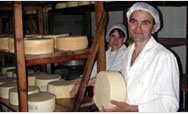You are here » Home » Telling Our Story
Success Story
Foster families provide love and attention that institutions cannot
Families Help Children in Crisis

| |
Photo: USAID/Kasey Vannett
|
|
Brothers Samir and Ante are adjusting well to life with their foster family in Tuzla, Bosnia and Herzegovina.
”We say the focus must be on what’s best for the children, not the bureaucracy,” said Jasmina Selimovic, an official from a USAID partner.
|
When Halida and Jasmin Avdic applied to become foster parents, they thought it would help fill the void created by their daughter’s departure from home to take a job. Little did they expect that their home would soon be filled by not one but three energetic boys. Ante, 11, Samir, 9, and their little brother Damir, 8, were thrust into a crisis when their mother was hospitalized and doctors told the family she would have to stay there for a long time. The boys’ social worker, Bozo Stjepic, understood the importance of placing them with a family instead of in an orphanage. “A foster family can provide more love and attention than an institution. Our foster mothers go to parents meetings, help the children study, take them to see specialists — everything a biological mother would do,” he said.
USAID supports a foster family program in Tuzla, Bosnia and Herzegovina. Its goal is to place children deprived of parental care into homes rather than institutions. The program requires extensive training of families and follow up by social workers. At first it’s not always clear why extra resources should be used when there are open spaces in institutions. “We say the focus must be on what’s best for the children, not the bureaucracy,” says Jasmina Selimovic, director of the program in Tuzla. “When social workers see how much better the children do in a family setting, they strive to place children with families despite the extra work it brings.”
Halida Avdic agrees. Although taking three new children into her home hasn’t been easy (“I’m just learning how to get all the meals cooked on time,” she laughs), she and her husband consider the boys their family. “Even our dog has accepted them and eats out of their hands,” she says. Avdic wishes more families would consider fostering: “I think that more children should enter this program earlier
Print-friendly version of this page (440kb - PDF)
Click here for high-res photo
Back to Top ^ | 

